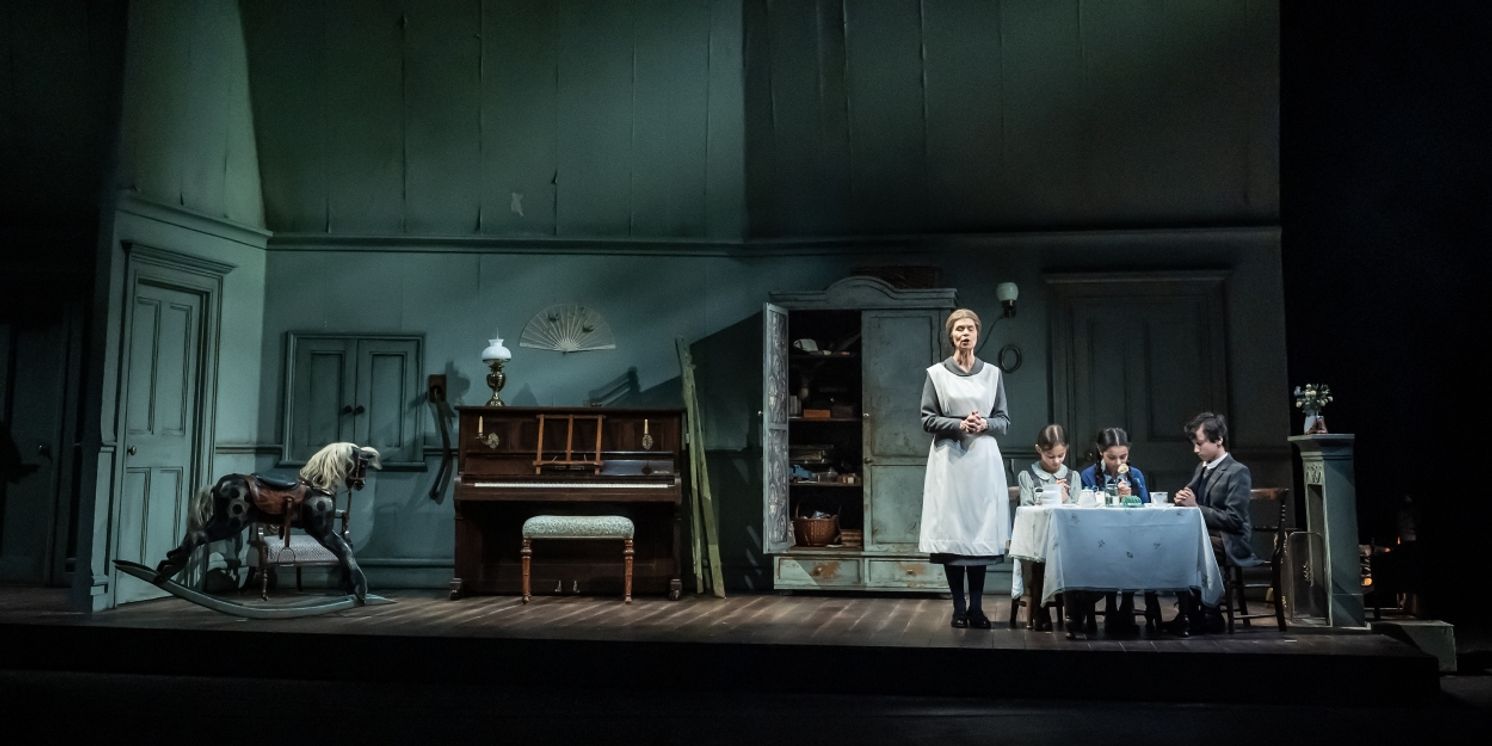Review: DEAR OCTOPUS, National Theatre
Dodie Smith's wartime comedy is a deliciously sarcastic curiosity.

![]() The Second World War is knocking on the doors of Europe and the Randolphs have gathered to celebrate a golden anniversary. With four generations under the same roof, Dora and Charles welcome the adults their children have become while their progeny poodle in the background.
The Second World War is knocking on the doors of Europe and the Randolphs have gathered to celebrate a golden anniversary. With four generations under the same roof, Dora and Charles welcome the adults their children have become while their progeny poodle in the background.
This is a generous summary of the play, which, in truth, shows almost no plot at all, replacing it with tons of socio-philosophical discourse and a vigorous amount of true-to-life chit-chat. Dodie Smith’s comedy is revived in a desaturated production that crackles with deliciously sly humour. Emily Burns directs a series of majestic tableaux that, while wordy and excessively traditional at times, offer an authentic slice of polite society.
While very little goes on narratively, the enormous cast discuss everything from the passing of time to the transitory nature of childhood, from vanity to malice, illicit affairs and how non-scandalous they can be, religion and motherhood. We could go on. They gossip, they chinwag, they judge everyone and no one at length with sarcastic wit-offs and healthy conversations. It’s not the most action-packed or dramatic piece in existence, but Dear Octopus turns out to be like a classic vintage wine: it’s sophisticated and might be an acquired taste, but it ultimately gets you jolly like only wartime entertainment can.
A fully revolving set designed by Frankie Bradshaw offers two family rooms and an additional nursery that appears with a further scenic trick. It’s absolutely gorgeous, the ancestral home becomes a character in itself, anchoring it to the genealogy and history of the typical upper-middle class.
The space is solid and carefully styled, lived in but immaculate, neither lavish nor flashy. It mirrors its inhabitants. Lindsay Duncan rules the household with an iron fist and a silver tongue, constantly finding jobs for all in an unconscious fear of idleness. Her Dora has a joyous love for life; she finds beauty in books and puppies, and is always looking for adventure, even at her age. It’s a poised and delicate performance.
Dora has raised her matches when it comes to sarcasm. Her kids are now confident and resourceful adults, but regress into their former habits and have silly arguments when they come together. Bethan Cullinane is an elegant Cynthia, her mother’s favourite and the circumstantial dark horse. Tight-lipped about her unconventional lifestyle, she nestles into the hearts of the audience immediately.
Jo Herbert and Amy Morgan (Hilda and Margery respectively) butt heads continuously while Pandora Colin’s Edna remains largely unobtrusive. While the role of the men is often relative here, we see a powerful characterisation from Malcolm Sinclair, who gives a surprisingly profound patriarch. He’s happy with the simple pleasures that his small existence has given him and overflowing with good-hearted bonhomie.
Bessie Carter is another highlight of the production (and the one with the most plot to her alongside Billy Howle’s Nicholas). She is meek and flustered as Dora’s long-time companion (a lady-in-waiting, essentially), but rises towards a strong-willed (but still subdued) woman on the cusp of 30. There’s a lot to say about the shortcomings of the show, from its firm gender roles to the slight misogyny and the veiled fat-shaming, but this is, after all, a late 30s comedy.
Smith peppers an equal amount of charisma all over, so the rest of the company is easily as deserving of praise as the main cast. Kate Fahy's Bella is deliciously venomous towards Dora, who’s in turn subtly vicious as well. There’s very little enmity in all of it, ultimately making this the healthiest dysfunctional group we’ve seen staged at The National Theatre in a while.
It’s intriguing to explore this programming, as the play isn’t exactly a safe commercial bet or a mainstream piece that people will flock to attend. It’s actually quite lengthy for what it is and ultimately not entirely built for a public too used to streaming services and quick social media content. This said, powering through the unavoidable lulls of the text pays off beautifully: this is a gold mine of dry humour and psychological fun.
Dear Octopus runs at The National Theatre until 27 March.
Photo credit: Marc Brenner
Reader Reviews

Videos

